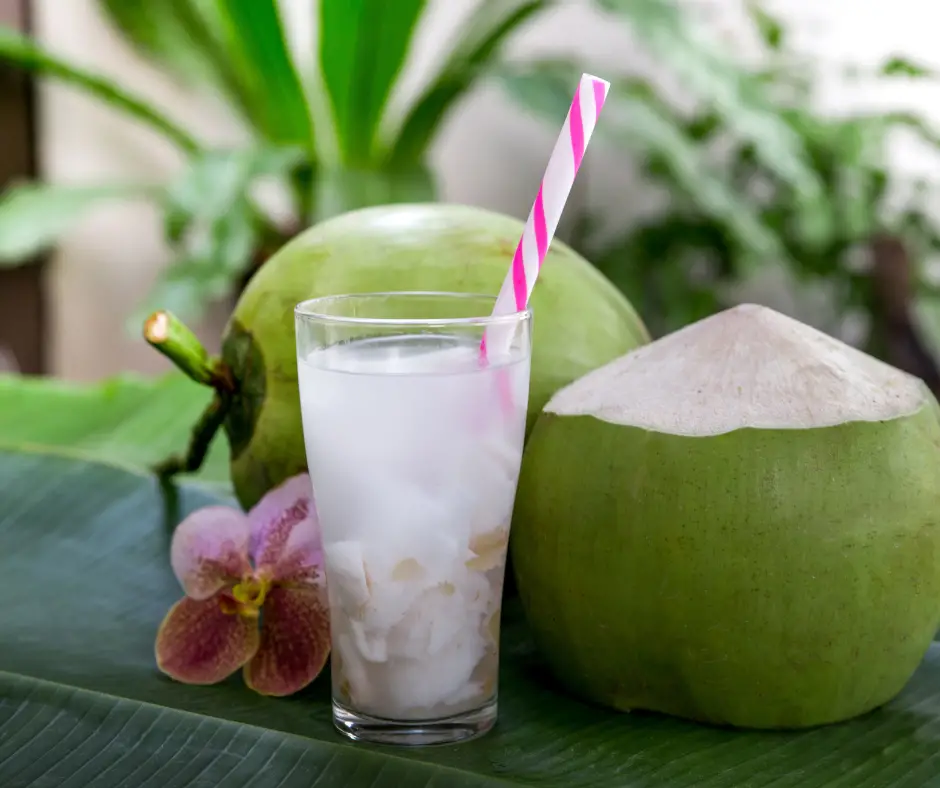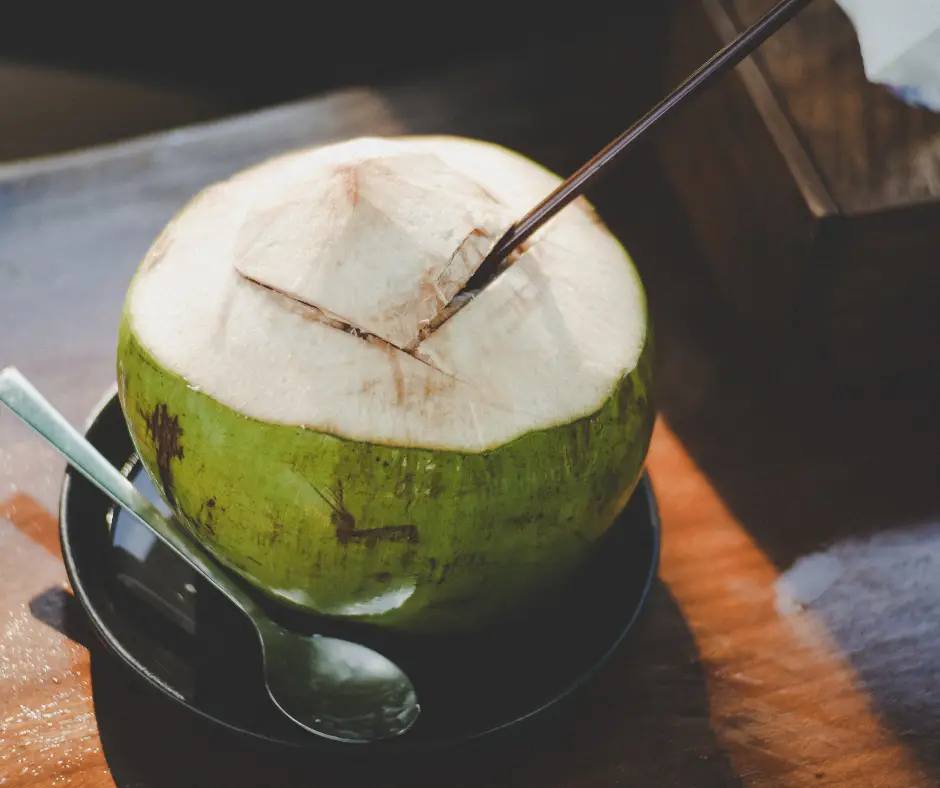Introduction
Coconut water has gained significant popularity recently due to its various health benefits, including its hydrating properties and high electrolyte content. However, there has been some confusion and misinformation regarding the effects of coconut water on digestion, particularly its supposed ability to regulate bowel movements. In this blog section, we will answer ‘Does Coconut Water Make You Poop?‘ and closely examine its impact on digestion.

The Popularity Of Coconut Water
Coconut water has become a trendy beverage for many seeking a natural and refreshing way to stay hydrated. It is the clear liquid inside coconuts and is often marketed as a healthier alternative to regular water or sports drinks. Rich in electrolytes such as potassium, sodium, and magnesium, coconut water has been praised for its ability to replenish fluids and aid in proper fluid balance.
Coconut Water As A Hydrating Beverage
One of the claims associated with coconut water is that it can help regulate bowel movements and relieve constipation. While it is true that coconut water contains dietary fiber, which can promote healthy digestion, the amount of fiber in a typical serving of coconut water is not significantly high enough to have a laxative effect. Consuming one to two cups of coconut water, the general serving size, should not result in abnormal bowel movements or laxative effects.
Moreover, coconut water can contribute to diarrhea if consumed in excessive amounts. This is primarily due to its high potassium content, which can cause diarrhea in certain individuals when consumed in large quantities. Additionally, some commercial varieties of coconut water may contain added sugars or artificial sweeteners, which can trigger digestive discomfort and contribute to diarrhea. It is essential to choose unsweetened varieties and consume coconut water in moderation to minimize the risk of experiencing digestive issues.
In conclusion, while coconut water does have some potential benefits for hydration and digestion, the idea that it has a direct and significant impact on regulating bowel movements is a myth. Consuming coconut water in moderation as part of a balanced diet can be a healthy and hydrating choice. Listening to your body and consulting with a healthcare professional if you have any concerns or pre-existing health conditions is important.
Stay tuned for the next section, where we will further explore the nutritional profile of coconut water and its comparison to other hydrating beverages.
The Nutritional Profile Of Coconut Water
Coconut water has gained popularity as a refreshing and hydrating beverage, but its impact on digestion, particularly its purported laxative effects, has sparked curiosity among many. This section will debunk the myth surrounding coconut water and its relationship with bowel movements.
Vitamins And Minerals In Coconut Water
Coconut water is packed with essential vitamins and minerals contributing to overall health. It is a rich source of electrolytes, including potassium and magnesium, vital for numerous bodily functions. A serving of coconut water typically contains approximately 82.5mg of magnesium and 825mg of potassium, providing 23% and 18% of the recommended daily allowance (RDA).
The Role Of Electrolytes In Hydration
Electrolytes, such as potassium and magnesium, are crucial in maintaining proper fluid balance. They are necessary for various bodily functions, including muscle contractions and nerve impulses. When it comes to digestion, electrolytes are involved in regulating bowel movements and promoting proper gut motility.
Contrary to popular belief, the laxative effects of coconut water are more pronounced when consumed in large quantities, typically exceeding the general serving size of one to two cups. This is mainly due to the osmotic laxative properties of magnesium and potassium, which draw water into the intestines, aiding in easier bowel movements. However, casual coconut water drinkers who enjoy the refreshing flavor should not expect laxative effects.
It’s important to note that excessive consumption of coconut water can lead to diarrhea, primarily caused by the high potassium content. Commercially prepared coconut water may also contain added sugars or artificial sweeteners, which can contribute to digestive discomfort and potentially trigger diarrhea. Opting for unsweetened varieties and avoiding multiple servings at once can minimize the risk of these adverse effects.
In conclusion, while coconut water does have potential laxative effects, it typically requires consuming large quantities for those effects to occur. Moderate consumption, within the general serving size, is unlikely to impact bowel movements significantly. Coconut water should be enjoyed as a hydrating and naturally electrolyte-rich beverage rather than solely relying on it as a laxative. As with any dietary decision, it’s always best to listen to your body and consult a healthcare professional if you have any concerns or pre-existing health conditions.
In the next section, we will explore the potential health benefits of coconut water and its role in overall well-being.
Coconut Water And Digestion

Coconut water has gained popularity recently for its potential health benefits, including its impact on digestion. However, myths and misconceptions surround ‘Does Coconut Water Make You Poop?’. Let’s debunk these claims and separate fact from fiction.
The Myth Of Coconut Water As A Laxative
One common belief is that coconut water has laxative properties and can make you poop. While it is true that coconut water contains high levels of magnesium and potassium, which can have a laxative effect when consumed in large quantities, the general serving size of coconut water does not have a significant enough mineral content to affect bowel movements. Casual coconut water drinkers who enjoy it for its refreshing flavor should not expect to experience laxative effects.
The Claims And Misconceptions
It is essential to understand that the laxative effects of coconut water are more pronounced when consumed in large quantities, typically more than four cups. The average serving size of coconut water does not contain enough minerals to affect bowel movements. Therefore, if you’re looking for a quick bowel movement, you must drink a significant amount of coconut water, which is not recommended.
Additionally, coconut water is often praised for its hydrating properties and electrolyte content. It can help treat mild dehydration due to diarrhea and is comparable to sports drinks promoting rehydration. However, drinking excessive amounts of coconut water can lead to excess potassium consumption, which may cause diarrhea in some individuals.
It’s important to note that commercially prepared coconut water may contain added sugars or artificial sweeteners, contributing to digestive discomfort and potentially triggering diarrhea. To minimize the risk of diarrhea, it is best to choose unsweetened varieties of coconut water and avoid consuming multiple servings at a time.
In conclusion, the claims of coconut water being a powerful laxative are exaggerated. While it does have a laxative effect in large quantities, the general serving size of coconut water does not significantly impact bowel movements. Consuming coconut water in moderation is essential, and choosing unsweetened varieties to avoid any adverse effects on digestion.
If you have concerns or pre-existing health conditions, it is always wise to consult with a healthcare professional before incorporating coconut water into your diet. Each individual’s digestion and metabolism are unique, so listening to your body and avoiding any food or beverage that triggers digestive discomfort is important.
The Science Behind Digestion
Digestion is a complex process in the body to break down food into nutrients that can be absorbed and utilized. The digestive system, which includes organs such as the stomach, small intestine, and colon, plays a crucial role in this process.
How The Digestive System Works
The digestive system works through a series of steps to ensure proper digestion and absorption of nutrients. It starts in the mouth, where food is chewed and mixed with saliva before being swallowed. From there, it travels to the stomach, further broken down by stomach acids. Next, the partially digested food moves into the small intestine, where enzymes break down proteins, carbohydrates, and fats into smaller molecules that can be absorbed into the bloodstream. Finally, any undigested food materials move into the colon, where water and electrolytes are absorbed, and waste products are formed to be eliminated from the body.
The Role Of Fiber In Promoting Regularity
Fiber has long been associated with promoting regular bowel movements and preventing constipation. But what exactly is the role of fiber in digestion?
Fiber: Fiber is a carbohydrate in plant foods that the body cannot fully digest. Instead, it passes through the digestive system mostly intact, adding bulk to the stool and aiding in regular bowel movements. There are two types of fiber: soluble and insoluble.
Soluble Fiber: Soluble fiber dissolves in water and forms a gel-like substance in the digestive tract. It can be found in oats, beans, and fruits. Soluble fiber helps to soften the stool and promotes regular bowel movements. It also provides fuel for beneficial bacteria in the gut, contributing to a healthy gut microbiome.
Insoluble Fiber: Insoluble fiber does not dissolve in water and adds bulk to the stool. It can be found in foods such as whole grains and vegetables. Insoluble fiber helps to increase stool volume, promoting regularity and preventing constipation.
Contrary to popular belief, coconut water does not contain significant fiber. While coconut water is known for its hydrating properties and electrolyte content, it does not have the same impact on digestion as fiber-rich foods. It is important to rely on other sources of dietary fiber for optimal digestion.
To promote gastrointestinal health and maintain regularity, consuming a variety of high-fiber foods is recommended. Some examples of high-fiber foods include fruits, vegetables, whole grains, legumes, and nuts. Drinking plenty of water when increasing fiber intake is essential to prevent discomfort such as bloating or gas.
In conclusion, while fiber is crucial in promoting regular bowel movements and maintaining gastrointestinal health, coconut water is not a significant source of fiber. However, it can still be enjoyed as a refreshing and hydrating beverage. To reap the benefits of fiber, it is important to incorporate various fiber-rich foods into your diet.
Coconut Water And Digestion: Debunking The Poop Myth

Coconut water has gained popularity as a refreshing and hydrating beverage, but there has been a lot of buzz around its supposed laxative effect. This section will debunk the myth and explore the truth about coconut water and digestion.
Does Coconut Water Make You Poop?
So, Does Coconut Water Make You Poop? Contrary to popular belief, drinking moderate amounts of coconut water does not have a significant laxative effect on the body. While coconut water contains fiber, magnesium, and potassium, essential for digestive health, the concentration of these minerals in a typical serving size of one to two cups is not enough to affect bowel movements.
Studies have shown that the laxative effects of coconut water are only observed when consumed in large quantities, typically more than four cups. So, if you enjoy coconut water as a casual drinker, you shouldn’t expect it to impact your bowel movements dramatically.
Other Factors Affecting Digestion
While coconut water may not directly make you poop, several other important factors play a role in digestion:
The Importance of a Balanced Diet: A well-balanced diet that includes a variety of fruits, vegetables, whole grains, and lean proteins is crucial for maintaining a healthy digestive system. Fiber-rich foods like fruits and vegetables help promote regular bowel movements.
Lifestyle and Hydration Habits: Staying hydrated is essential for proper digestion. Drinking adequate water throughout the day helps soften stools and prevent constipation. Including coconut water as part of your overall hydration routine can contribute to your daily fluid intake, but it should be consumed in moderation.
Coconut water has many health benefits, including its high electrolyte content and hydrating properties. However, the idea that coconut water has a significant laxative effect has been exaggerated. It is important to consume coconut water in moderation, as excessive intake may lead to potential digestive discomfort or diarrhea.
Remember, maintaining a healthy digestive system goes beyond food or beverage. A balanced diet that includes a variety of nutrients, proper hydration habits, and a healthy lifestyle are integral for optimal digestion.
It’s always a good idea to listen to your body and consult with a healthcare professional if you have any concerns or pre-existing health conditions before making any significant changes to your diet or hydration routine.
In the next section, we will explore the different brands of coconut water available on the market and their unique features. Stay tuned!
Health Benefits Of Coconut Water
Coconut water has become a refreshing and hydrating beverage in recent years. It is known for its electrolyte content, including potassium, sodium, and manganese. These minerals are vital in hydration, muscle function, and overall health. While coconut water offers several health benefits, certain myths surround ‘Does Coconut Water Make You Poop?’. Let’s debunk this myth and explore the benefits of coconut water in more detail.
Hydration And Exercise Performance
Coconut water is often touted as a natural alternative to sports drinks due to its electrolyte content. Electrolytes are crucial for maintaining fluid balance, especially during exercise or physical activity. While coconut water provides moderate potassium and sodium, research suggests it may not be more hydrating than plain water alone.
A study published in the Journal of the International Society of Sports Nutrition compared the effects of consuming coconut water and water during submaximal exercise and subsequent time trial performance. The results showed that coconut water did not significantly improve hydration markers or exercise performance compared to water alone.
Therefore, plain water remains the smart choice when it comes to hydration during exercise. It is essential to stay properly hydrated by drinking adequate amounts of water throughout the day, especially during physical activity.
Coconut Water As A Source Of Antioxidants
Coconut water contains various nutrients, including antioxidants that help neutralize oxidative stress and free radicals in the body. These antioxidants are crucial in protecting cells from damage and reducing inflammation.
While some studies have shown promising results regarding the antioxidant properties of coconut water, most of the research has been conducted on animals or in test tubes. More human studies are needed to fully understand the impact of coconut water on the antioxidant system.
It’s important to note that while coconut water offers potential health benefits, it should not be considered a cure-all for digestive issues or other health concerns. Each individual’s response to coconut water may vary, and it is always best to consult a healthcare professional for personalized advice.
In summary, coconut water can be a hydrating and refreshing beverage due to its electrolyte content. However, its impact on digestion and overall health may be overstated. Incorporating a balanced and varied diet and proper hydration is essential for optimal digestive health.
FAQ: Does Coconut Water Make You Poop? Debunking the Poop Myth
Q: Does drinking coconut water make you poop?
A: While coconut water is known for its health benefits, including aiding digestion and promoting hydration, it sometimes has a mild laxative effect. Drinking a moderate amount of coconut water is unlikely to cause any adverse effects on bowel movements. However, consuming excessive amounts of coconut water may lead to excess potassium consumption, which can result in diarrhea for some individuals.
Q: Is coconut water good for digestion?
A: Yes, coconut water contains fiber and magnesium, which are important elements for healthy digestion. These nutrients help regulate bowel movements and promote regularity. Additionally, coconut water has natural electrolytes that can help maintain proper fluid balance in the body, supporting overall digestive health.
Q: Can coconut water treat diarrhea?
A: Coconut water is considered a good beverage choice when dealing with mild dehydration caused by diarrhea. Studies have found that coconut water is effective in treating dehydration due to diarrhea, comparable to sports drinks in promoting rehydration. However, it’s important to note that excessive consumption of coconut water may exacerbate diarrhea due to its laxative effect.
Q: Can coconut water cause diarrhea?
A: Drinking too much coconut water can cause some people diarrhea. High potassium levels from excessive consumption may lead to loose stools. Moreover, coconut water contains fermentable oligosaccharides, disaccharides, monosaccharides, and polyols (FODMAPs), which can draw water into the intestines and cause diarrhea in susceptible individuals. Additionally, commercially prepared coconut water with added sugars or sweeteners may also contribute to digestive discomfort or diarrhea.
Q: How should I consume coconut water to avoid diarrhea?
A: To minimize the risk of experiencing diarrhea from coconut water, it is advisable to choose unsweetened varieties and consume them in moderation. Avoid drinking excessive amounts of coconut water and listen to your body’s response. If you notice that coconut water triggers digestive discomfort or diarrhea, it’s best to avoid it altogether or consult a healthcare professional for personalized advice.
Q: Is coconut water beneficial for overall health?
A: Yes, coconut water is indeed beneficial for overall health. It is a natural source of hydration, packed with essential electrolytes like potassium, sodium, magnesium, and calcium. Coconut water also contains vitamins, minerals, and antioxidants that can support weight loss, kidney function, diabetes management, and skin health. Incorporating coconut water into a balanced diet can be a smart and refreshing choice for improving overall well-being.
Conclusion
Now you should know the answer to ‘Does Coconut Water Make You Poop?’. Coconut water is popular for its hydrating properties and high electrolyte content. While there is some truth to the claim that coconut water can have a laxative effect on the body, it is important to understand the details and debunk the myth that it significantly impacts digestion.
Debunking The Myth: Coconut Water And Digestion
Contrary to popular belief, coconut water does not drastically affect bowel movements unless consumed in large quantities. The laxative effect of coconut water is mainly attributed to its high fiber content and the presence of minerals like magnesium and potassium, which act as osmotic laxatives. These minerals draw water into the intestines, making bowel movements more efficient.
However, the average serving size of coconut water, about one to two cups, does not contain enough minerals to impact digestion significantly. For casual drinkers who enjoy coconut water for its refreshing flavor, there is no need to worry about experiencing laxative effects.
It is worth noting that excessive consumption of coconut water can lead to excess potassium intake, which may cause diarrhea in some individuals. Furthermore, some commercially prepared coconut water may contain added sugars or artificial sweeteners, which can contribute to digestive discomfort and potentially trigger diarrhea. To avoid these issues, it is best to choose unsweetened varieties of coconut water and consume them in moderation.
While coconut water can be a hydrating and natural source of electrolytes that may help relieve constipation and promote bowel movements, it is important to listen to your body and avoid consuming excessive amounts that may lead to digestive issues.
Key Takeaways And Recommendations
Here are some key takeaways and recommendations regarding coconut water and digestion:
- Coconut water may have a mild laxative effect due to its high fiber content and the presence of minerals like magnesium and potassium.
- Consuming one to two cups of coconut water as part of a balanced diet is unlikely to cause significant changes in bowel movements.
- Excessive consumption of coconut water can lead to diarrhea, especially if it contains added sugars or artificial sweeteners.
- To minimize the risk of digestive discomfort, opt for unsweetened varieties of coconut water and avoid consuming multiple servings at a time.
- If you have any concerns or pre-existing health conditions, it is always wise to consult with a healthcare professional before incorporating coconut water into your diet.
References:

James Robinson loves coffee and blogging all about coffee. His blog is full of informative posts about the best ways to enjoy coffee and the many different types of coffee out there. He also shares recipes for delicious coffee-based dishes, and his followers can always count on him to offer tips on how to improve their coffee-making skills.

